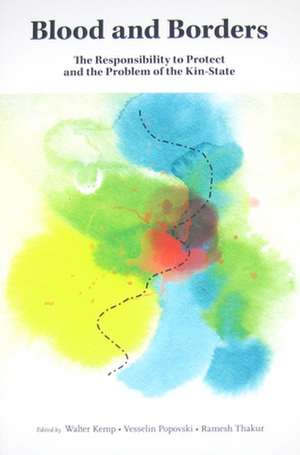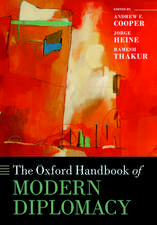Blood and Borders: The Responsibility to Protect and the Problem of the Kin-State
Editat de Walter Kemp, Vesselin Popovski, Ramesh Thakuren Limba Engleză Paperback – 28 iul 2011
Map lines delineating statehood can become blurred by bloodlines of nationhood. Interethnic conflict and genocide have demonstrated the dangers of failing to protect people targeted by fellow citizens. When minority groups in one country are targeted for killings or ethnic cleansing based on their group identity, whose responsibility is it to protect them? In particular, are they owed any protective responsibility by their kin-state? How can cross-border kinship ties strengthen greater pan-national identity without challenging territorially defined national security?
As shown by the Russia–Georgia conflict over South Ossetia, unilateral intervention by a kin-state can lead to conflict within and between states. The world cannot stand by when minority rights are being trampled, but the protection of national minorities should not be used as an excuse to violate state sovereignty and generate interstate conflict.
This book suggests that a sensible answer to the kin-state dilemma might come from the "neither intervention nor indifference" formula that recognizes the special bonds but proscribes armed intervention based on the ties of kinship.
As shown by the Russia–Georgia conflict over South Ossetia, unilateral intervention by a kin-state can lead to conflict within and between states. The world cannot stand by when minority rights are being trampled, but the protection of national minorities should not be used as an excuse to violate state sovereignty and generate interstate conflict.
This book suggests that a sensible answer to the kin-state dilemma might come from the "neither intervention nor indifference" formula that recognizes the special bonds but proscribes armed intervention based on the ties of kinship.
Preț: 289.17 lei
Nou
Puncte Express: 434
Preț estimativ în valută:
55.33€ • 57.77$ • 45.79£
55.33€ • 57.77$ • 45.79£
Carte tipărită la comandă
Livrare economică 04-18 aprilie
Preluare comenzi: 021 569.72.76
Specificații
ISBN-13: 9789280811964
ISBN-10: 9280811967
Pagini: 268
Dimensiuni: 152 x 229 x 15 mm
Greutate: 0.43 kg
Editura: Brookings Institution Press
Colecția United Nations University Press
ISBN-10: 9280811967
Pagini: 268
Dimensiuni: 152 x 229 x 15 mm
Greutate: 0.43 kg
Editura: Brookings Institution Press
Colecția United Nations University Press
Notă biografică
Walter Kemp is director for Europe and Central Asia at the International Peace Institute. Vesselin Popovski is senior academic program officer and head of the Peace and Security section at the Institute for Sustainability and Peace at the United Nations University. Ramesh Thakur is professor of international relations in the Asia-Pacific College of Diplomacy, Australian National University.
Descriere
Map lines delineating statehood can become blurred by bloodlines of nationhood. Interethnic conflict and genocide have demonstrated the dangers of failing to protect people targeted by fellow citizens. When minority groups in one country are targeted for killings or ethnic cleansing based on their group identity, whose responsibility is it to protect them? In particular, are they owed any protective responsibility by their kin-state? How can cross-border kinship ties strengthen greater pan-national identity without challenging territorially defined national security?
As shown by the Russia–Georgia conflict over South Ossetia, unilateral intervention by a kin-state can lead to conflict within and between states. The world cannot stand by when minority rights are being trampled, but the protection of national minorities should not be used as an excuse to violate state sovereignty and generate interstate conflict.
This book suggests that a sensible answer to the kin-state dilemma might come from the "neither intervention nor indifference" formula that recognizes the special bonds but proscribes armed intervention based on the ties of kinship.
As shown by the Russia–Georgia conflict over South Ossetia, unilateral intervention by a kin-state can lead to conflict within and between states. The world cannot stand by when minority rights are being trampled, but the protection of national minorities should not be used as an excuse to violate state sovereignty and generate interstate conflict.
This book suggests that a sensible answer to the kin-state dilemma might come from the "neither intervention nor indifference" formula that recognizes the special bonds but proscribes armed intervention based on the ties of kinship.












